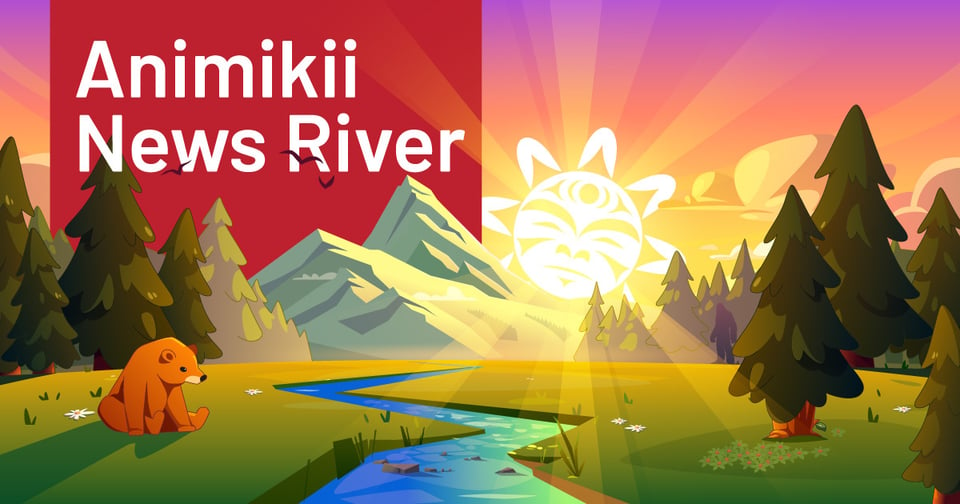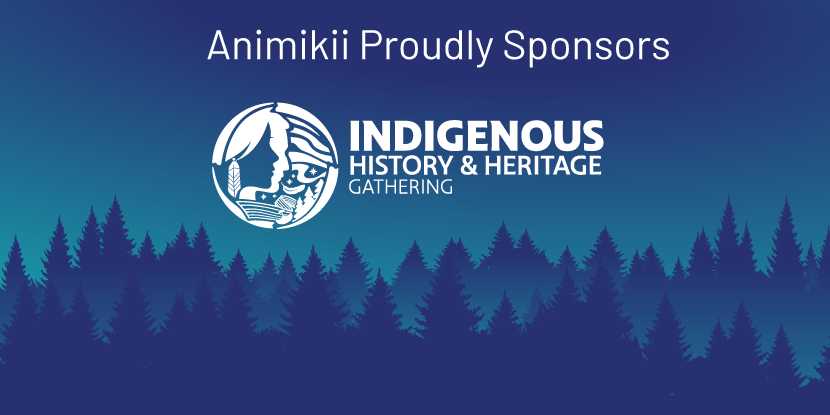Gathering to share Indigenous history, heritage and tech
Diverse groups are working to amplify the distinct stories of Indigenous Peoples.

Boozhoo News River Readers,
Every week, we hand-pick the most important stories in Indigenous innovation, research, and culture. Stay connected to what matters.
If you enjoyed the stories in this week’s News River - invite others to join the conversation - forward this email to a friend or colleague!
This week’s stories include:
Last week to apply for the Indigenous Attendee Program and get complimentary tickets to Web Summit Vancouver! Applications for the program close on Friday May 16th, 2025.
An article that explores the question: If English is the main driver of most large language models - will AI contribute to language revitalization, or language oppression?
A story sharing how Survivors may be unaware their IAP files could be preserved as part of the historical record at the NCTR - but the documents may be destroyed instead.
Proud to Sponsor the Indigenous History & Heritage Gathering 2025

The big picture: We're thrilled to announce that Animikii is sponsoring the Indigenous History & Heritage Gathering (IHHG) taking place June 2-4, 2025, at the RBC Convention Centre in Winnipeg. This gathering is one of the many important events held during Indigenous History Month. It brings together diverse groups who are working to amplify the distinct stories of Indigenous Peoples across Turtle Island, and represents a pivotal moment as we mark a decade since the Truth and Reconciliation Commission presented the 94 Calls to Action.
Why it matters: This gathering provides a platform for Indigenous leaders and communities who are actively preserving and carrying forward their stories. This year's gathering features distinguished keynote speakers including Dr. Wilton Littlechild, who has spent more than 40 years building bridges between Indigenous and non-Indigenous Peoples, and Phyllis Webstad, residential school Survivor and inspiration behind Orange Shirt Day. The IHHG's three program tracks listed below, create essential spaces to engage in meaningful dialogue, explore our shared histories, and commit to building a better future rooted in respect, understanding, and reconciliation.
Key points:
Reflecting on the TRC’s Legacy: This track acknowledges the progress and challenges experienced in the decade since the 94 Calls to Action and provides space for critical reflection and dialogue. Attend the session - A Decade of Change: Reflecting on the TRC Calls to Action and the Role of Media
Indigenous Culture and Language: This track showcases Indigenous cultural expressions and the revitalization of Indigenous languages, celebrating creativity, resilience, and cultural resurgence. Attend the session - Legacy of Strength: 50 Years of Indigenous Women+ Organizing
Sharing Stories: This track emphasizes the power of storytelling, creating platforms for sharing and celebrating personal and community-driven narratives. Attend the session - Reclaiming Tomorrow: Indigenous Youth on the Frontlines of Change
What they’re saying: “At the gathering, I am most looking forward to learning about how Indigenous youth of today are reclaiming traditional knowledge through art and media to help others connect with their own cultural identity.” - Nicole Strangeman
“While my professional roles have provided some exposure to various Indigenous cultures, attending the Indigenous History and Heritage Gathering will offer a great opportunity to expand my exposure to the diverse histories and experiences of Indigenous Peoples from across Turtle Island.” - Tom Spetter
What’s next: Our team is looking forward to connecting with you at this important gathering as we collectively work toward a future where Indigenous stories and knowledge are respected, protected, and celebrated.
Learn more: View the full program and register to attend here: https://ihhg.ca/
Curated Articles:
Indigenous scientists are fighting to protect their data — and their culture
The Trump administration’s war on DEI is spurring scientists and researchers from Indigenous communities to seek new protections for their data. US federal law recognizes many tribal nations as sovereign political entities, not racial or ethnic groups, but that hasn’t stopped Trump from sweeping up Indigenous peoples in his attacks on diversity, equity, and inclusion (DEI). From Alaska to New England, Indigenous researchers — and the communities they serve — are losing access to dollars for critical science that could help them amid the planet’s changing temperatures. They’re worried that the loss, theft, seizure, or privatization of their research — which often includes ancient cultural knowledge — could be next.
How AI could help safeguard Indigenous languages
If there are few speakers left of a language, how does a community revive it? In our current era, 3,000 languages are at risk of extinction due to the pressures of colonization, globalization, forced cultural assimilation, environmental devastation and other factors. According to Canada’s Commission for Indigenous Languages, “research shows that no Indigenous language in Canada is safe and that all are in varying stages of endangerment.” According to the World Economic Forum, most AI chatbots are trained on 100 of the world’s 7,000 languages. English is the main driver of most large language models. This scenario leaves the bulk of the world’s languages in the dust. In the coming years, will AI contribute to language revitalization, or language oppression?
Digital Governance Standards Institute launches ethical data standard for community services
The Digital Governance Standards Institute has announced the release of a new national data governance standard to help nonprofit and community service organizations across Canada ethically manage personal and sensitive data. “This isn’t just about technology – it’s about trust, transparency, and ensuring that the move toward digital doesn’t deepen existing disparities,” said Wilfreda Edward, executive director of the Canadian Centre for Nonprofit Digital Resilience. “By embedding equity and community accountability into data governance, this standard helps create a shared foundation for nonprofits to build ethical, secure, and inclusive digital practices.”
Files documenting worst abuses at residential schools to be destroyed unless survivors ask otherwise
Files documenting the worst abuses at residential schools are set to be destroyed in 2027 and, despite a multi-year outreach, some survivors say they didn't know they could opt to have their files preserved. Christina Kitchekesik, a member of Tataskweyak (Split Lake) Cree Nation, attended Guy Hill residential school near The Pas, Man., where she endured physical, mental, spiritual and sexual abuse. As an advocate for survivors, Kitchekesik ,74, has shared her own experience at residential school with others over the years to help promote understanding and healing. Despite her advocacy work and her regular contact with people at the National Council for Truth and Reconciliation (NCTR), which stores the records from the TRC, Kitchekesik says she did not know that she could have her IAP file preserved as part of the historical record at the NCTR.
The Collaboratory for Indigenous Data Governance seeks an undergraduate student to aid in the creation of a repository. This repository will provide documentation, resources, and references to inform 1) Indigenous Peoples as they collect, store, and govern their data and 2) the relationships Indigenous communities have with outside institutions or organizations holding Indigenous data. The student will learn Indigenous Data Governance principles and how they apply to the policies and practices for the hub. The student will work with Graduate Research Associate Jewel Cummins under the supervision of Dr. Stephanie Russo Carroll to compile resources, track consent documentation from Indigenous communities and institutions, and create the process documents.

